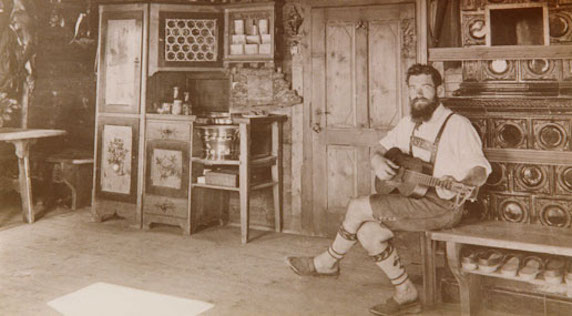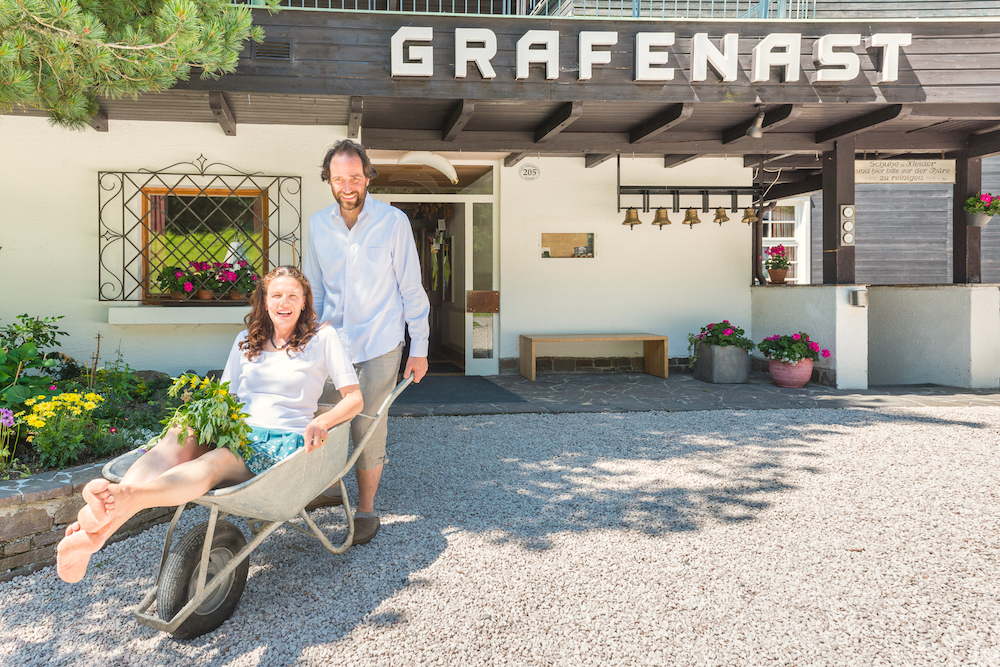Editor’s note: We feel strongly that wellness travel goes hand-in-hand with sustainability and ethical business practices. Tourism represents the globe’s largest sector both in dollars and by the impact that travellers have on communities, large and small.
We hope you enjoy this profile of the Grafenast, an organic hotel in Germany that we feel beautifully represents a benchmark for sustainability in [wellness] travel.
Living in close touch with nature is characteristic of the Unterlechner family, starting with Toni Unterlechner, who settled down and found a new home in the Tirol Mountains at the beginning of the 20th century.
“My great-grandfather Toni’s last wish was to be buried here,” Peter Unterlechner recounts. For this, a chapel in the mountains was required and the family finally built one.
Peter Unterlechner, who is the fourth generation in the management of the hotel, feels close to the mountains as well. He appreciates the perspective from high above that frees mind and soul, as he says.
“I am lucky to live and work in a place where other people spend their vacation. Being in a place that is good for you is something very valuable.”
This focus on wellbeing, the closeness to nature and the seclusion and tranquillity of the place distinguish the special character of the organic hotel Grafenast.
From the centre of tourism to a haven of peace
Toni Unterlechner was one of the pioneers that felt drawn to the mountains around 1900. In 1907, at a time when the first skiers came here, he built the first house that is today called “Rodelhütte.”
Being the eldest of twelve children, he could have taken over the family’s tannery and ropemaking business. Instead, he decided to earn his livelihood in the mountains and established the Grafenast as a place where the tourists coming from the cities to the “Kellerjoch” mountain to find some balance, could rest on their way up.
In the course of time, the house was rebuilt to take in overnight guests. With its “Stube”, a kind of dining and living room, preserved in its original state, the house is still a central part of today’s hotel that has been significantly extended by now.
After the war, due to the improvement of infrastructure, tourism moved to the side valleys – and the family decided that the resulting tranquillity would benefit both them and their guests.

Slow Food from Grafenast’s garden
The idea to develop the Grafenast into an organic hotel arose at the beginning of the 1980s when diplomatic representatives challenged the hotel’s kitchen with the wish of preparing vegetarian meals for two weeks.
At that time and in this part of the world, restaurant kitchens still had little experience with vegetarian cooking. However, the Unterlechners gladly took up the challenge. Today, they are still open to the individual wishes of their guests, many of whom prefer vegetarian and vegan food.
“The food is mainly regional with a few international surprises,” as the recent Slow Food Guide describes Grafenast’s organic restaurant.
The ingredients are not only 100 % organic, but most of them come from the hotel’s garden or from local farming. This way, guests can enjoy regional treasures such as raw goat milk cheese from Alpbach or organic calf from Pillberg.
Combining the good old with the good new
The idea may have seemed new at that time. However, for the owners of the Grafenast it was quite obvious. “We grew up with sustainability and an organic lifestyle,” Peter Unterlechner recounts. “That is why it is completely normal for me: green energy, waste separation, healthy food, regional trade.”
And so it seems only natural that the Grafenast became Tirol’s first CO2 neutral hotel. The rooms are furnished according to strict criteria of ecology and sustainability and larch timber floors, spelt upholstery, elaborate sleeping systems and the absence of electro smog create a healthy and calm environment.
Living in harmony with nature is not a new approach, as Unterlechner emphasizes, but it fell into oblivion during industrialization: “We have to learn once again how to live with nature”, he says. “This goes for everyone, but especially for the enterprises and particularly for those in tourism, as they draw their future potential from nature.”
The common good as a benchmark for measuring success
The latest project is to have a Common Good Balance Sheet produced and published. According to the principle of “Economy for the Common Good“ social and ecological aspects are taken into account for the economic evaluation of an enterprise and its contact groups, such as customers, partners, employees and suppliers.
The Unterlechners strongly promote environmental awareness and social justice, the latter by establishing integrative jobs. They see the Balance Sheet as an opportunity to discover further potentials.
“We have to keep an open mind to develop further,” Peter Unterlechner says – and this sounds like a promising future for wellness travel and sustainability combined.
All images © Grafenast.




